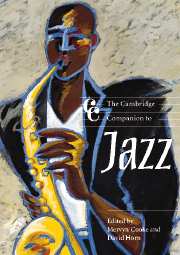Book contents
14 - History, myth and legend: the problem of early jazz
from Part Four - Jazz soundings
Published online by Cambridge University Press: 28 September 2011
Summary
There are many tantalising tales of early jazz and its origins that conjure up both romantic and tragic images of an evolving musical tradition. These tales become a bit hazy as they are passed down, and the truth often obscured. Because jazz has frequently been accorded great reverence by its loyal fans, the tales of its heroes and their exploits have grown in great proportion, often leading to misunderstandings. It is only recently through accurate and patient research that we have come to some less colourful but more informative conclusions about the origins of this music. Likewise, viewing a faded old photograph may cause us to wax nostalgic about the persons staring at us across a century or more. If we could find a pristine negative of the photo and could make a new print of it, we would have a truer representation of that moment in time. There would be greater detail and clarity. However, with the sharper, truer image, we would miss some of that faded quality from which mystique and legend emerge.
One of the great legends of the pre-history of jazz was an African-American cornettist from New Orleans named Buddy Bolden (1877–1931). To many he is considered to be the first of all jazz musicians. Stories of his powerful cornet are among the earliest and most prominent in jazz. Legend tells us that Bolden played loud and low down, drank heavily, ran with fast women. His music was exciting and intoxicating.
- Type
- Chapter
- Information
- The Cambridge Companion to Jazz , pp. 270 - 285Publisher: Cambridge University PressPrint publication year: 2003



